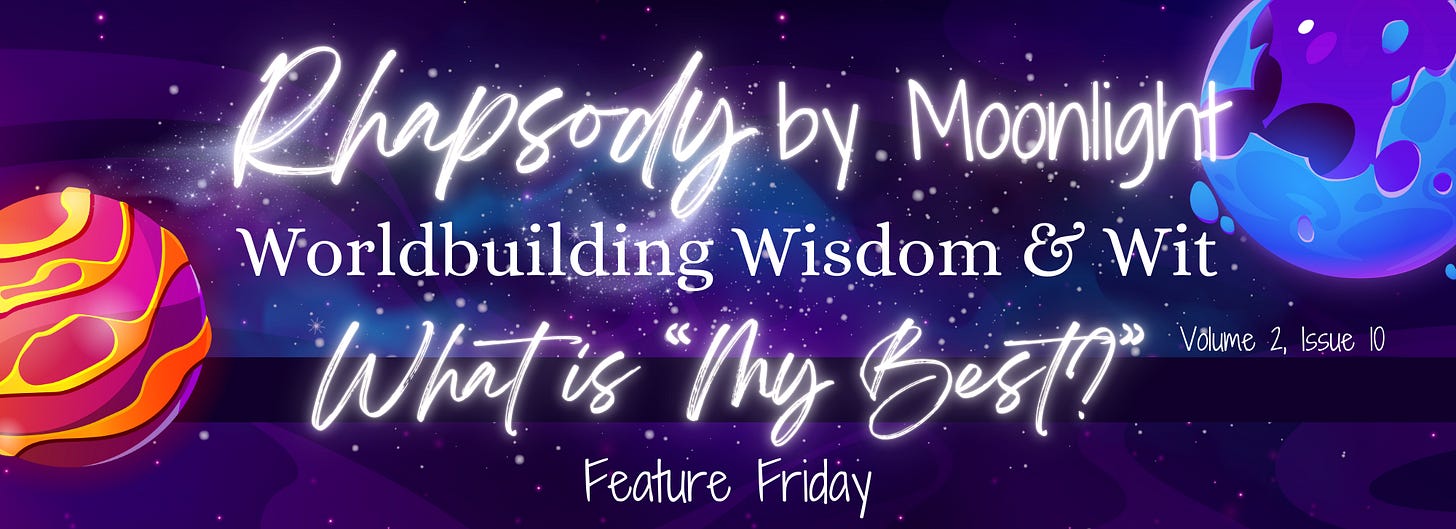What is "My Best?"
How do you determine your best work? Haly offers 3 strategies for honestly evaluating your work for submission to a competition, agent, or publisher.
Being Honest with Yourself About Your Work
Feedback is critical to growth, but getting helpful feedback can be difficult. When our friends and family are willing to read our work — which is far from guaranteed — they are often more interested in supporting our feelings rather than our growth, and critiquing our own work is can be the sort of emotional minefield that leads to endless sprees of productive procrastination.
Nothing gets my laundry done like staring down a submission deadline.
Within the worldbuilding community, one of the big events of the year are the WorldAnvil Worldbuilding Awards. The submission period is currently open through February 8th, and so I’ve been looking through my work to see what, if anything, I’d like to submit. Looking back at how my worlds have grown, I’m proud of the incredible amount of work I’ve put forth over the last two years, even if my earlier writing doesn’t compete with where I am now in my creative journey.
There are several different categories open for submission. Some are based on the use of WorldAnvil tools (such as timelines, maps, and chronicles), while others are based on artistic beauty, and still more are based around themes such as “Rise of Nations” or “Wondrous Nature.” I’ve been working on a couple of unique map ideas and I’m considering the master timeline for Argentii as a submission.
The only thing I’ve decided on so far is my entry for the “Pillars of Progress” award, Harmony Station.
What Even is “My Best?”
Unlike large production companies for music, television, and movies, I cannot afford a PR company to pick out my best work and hype it up to all of the media outlets in the usual “For Your Consideration” award season hype. It’s just me and a few of my most trusted writer friends evaluating my work for me to submit, myself.
Determining our best work isn’t easy, but it’s a critical skill for creative people who want to improve. Even more so for people who enjoy competition or are seeking market success. Fortunately, I’ve got a strategy that might prove useful to you, too!
1. Start with a Positive Mood
Just like your mood affects your writing, it also affects your reading! Trying to evaluate your own work when you’re in a shitty mood is only going to produce shitty results. As humans, it is nearly impossible for us to remove our emotions from our judgement.
Think about it for a moment: we all have those days where it feels like we can’t do anything right. You burn your toast, spill your coffee, get out the door late, end up with a wet sock from the rain, and that’s all before you even clock in at work!
With that mood, are you going to be able to read anything you wrote with an honest perspective? I know I couldn’t! My intrusive thoughts about how I’m an idiot for burning the toast and clumsy for spilling the coffee would overflow into how I can’t even write a decent story!
Remember: starting with a positive outlook will allow you to be more honest with yourself and give you a better perspective on what you’ve done right, and where you can improve.
2. Look for Potential, Not Perfection
Editing is a thing. You can — and should — do it! It’s tempting to avoid our old pieces, or to cringe and groan if confronted with them. This is not the way to progress and growth in any artistic endeavor.
When evaluating your work don’t just consider how it is, consider how it could be with some editing and polish.
When you read through a piece, consider how the idea makes you feel. Don’t worry about your word choices or the typos you’re just now noticing, just focus on the idea. Does it still give you the same creative goosebumps as when you first wrote it? If so, then clean it up to be more in line with your current style.
And if not, then move on to the next.
Remember: a solid idea with lackluster word choices can be rewritten into something stellar!
3. Enlist Other Writers
Writing communities exist everywhere. Online, there is WorldAnvil, Substack, Tumblr, Reddit, Discord, Goodreads, Medium…the list goes on and on. If face-to-face is your thing, then check your local library for writing groups. Book clubs often harbor writers, as well. With just a little work, and a whole lot of overcoming your own fears, you can find other writers.
Getting feedback from other writers is critical to growth. Whether that’s through a writing group, a class or workshop structure, or even hiring an editor. Honest, constructive critique will point out what you’re doing right, and where you have room to improve.
Remember: good critique should be geared toward helping you improve, be receptive to feedback that is delivered with polite honesty. It’s always easy to tell the helpers from the haters.
Don’t Forget…
Opening yourself up to constructive feedback is a daunting, often frightening, choice. Art is one of the most intimate acts we can commit. Still, it’s necessary for our growth and development as creatives. Whenever possible…
Start with a positive attitude
Look for potential, not perfection
Enlist the help of other writers
By practicing these solid strategies, you’ll be able to develop a stronger sense of your own artistic best!
Coming This Week:
Saturday Quick Six: Blended Genre Worldbuilding Prompts
Sunday: Weekly digest
Next week: Rebirth






